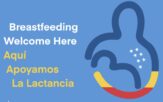By Janiah Fladger, MPH Candidate
UNC Gillings School of Global Public Health
Field Placement with Breastfeed Durham, Summer 2025
This summer, I spent ten weeks knocking on business doors, managing spreadsheets, tabling at community events, and having deep, unexpected conversations about breastfeeding. As the Recruitment Coordinator for Breastfeed Durham’s Breastfeeding-Friendly Business Awards, I didn’t just help local businesses apply for an award—I got to help shape a more supportive, more visible, and more affirming Durham for every family feeding a baby.
At its heart, this work was about Step 6 of the Ten Steps to a Breastfeeding Family Friendly Community: making sure families experience breastfeeding support everywhere they go. Restaurants, barber shops, gyms, libraries. No matter the setting, families should know: you belong here, and feeding your baby is welcome.
Some of what I did:
- Tracked over 200 businesses across Durham, using a spreadsheet to follow outreach, interest, and award status
- Used ZIP code data to make sure we weren’t missing whole areas of the city
- Showed up at events like Manifest RCC and the Take No Bull Women’s Conference to meet families where they were
- Handed out “Wonder Women Breastfeed” clings and talked to new businesses through the Chamber of Commerce
- Had real conversations—about barriers, about pride, about visibility, about belonging
But beyond what I did, this experience changed how I see public health.
One moment that will stay with me forever was at the Rainbow Collective for Change’s Annual Manifest RCC Event. Breastfeed Durham had a table near the water. I met several transgender and nonbinary parents who told me they had never seen a breastfeeding organization show up for them like this. We talked about signage, about policy, and about presence. I saw how much harm people had experienced from healthcare systems—and how much healing could begin with just being visible, affirming, and consistent.
That moment—and many others—taught me that equity isn’t a bullet point. It’s a relationship. It’s earned. And it starts by showing up.
Here’s what I learned:
- People respond to visibility. A cling in the window really can open a door to conversation and culture change.
- ZIP code data works. We were more intentional, more efficient, and more equitable when we tracked where we were going—and where we weren’t.
- In-person outreach matters. Email can’t build trust the way eye contact can.
- Queer families want—and deserve—to be centered. Inclusive language isn’t enough. They need affirming care, affirming spaces, affirming policies.
This placement changed how I think about community health. I used to think I wanted to work with families. Now I know I want to work for them, alongside them, in spaces that truly reflect their needs, identities, and dreams.
To learn more about my experience and gain further insight on my work with businesses, please find my final deliverable below:
